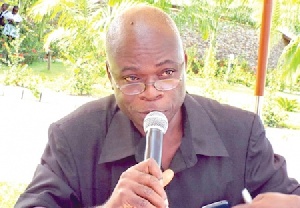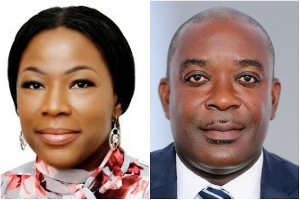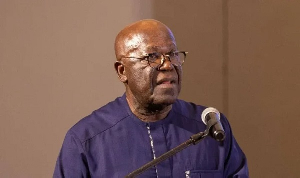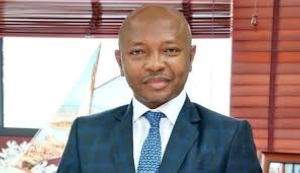Today, I decided to write again about the Public Accounts Committee (PAC) of Parliament because the committee finished its second public hearing under the 7th Parliament of the Fourth Republic a fortnight ago and hopefully its report will be laid before the House when it resumes on October 3, 2017.
During the two (2) weeks sittings to examine the audited accounts showing the appropriation of sums granted by Parliament to meet the public expenditure of the government as presented to the House by the Auditor-General of Ghana, lots of shocking revelations about criminal acts perpetrated by some public office holders emerged, yet not a single person has been charged or sentenced to jail by the committee.
Many watchers of democracy believe like the previous committee’s report, this one too will be left on the shells to gather dust. How come a committee which has powers of a High Court not pronounce judgment and subsequently sentence known criminals to jail terms and as well reward hard working public officers to deter others from engaging in corrupt practices in the country?
The Public Accounts Committee of Parliament as it stands now is like a king without a stool or skin and a kingdom. How can it function?
The power and function of PAC
In fulfilling its functions, the 1992 Republican Constitution in Article 103 (6) grants PAC, like any other Committee of Parliament, the powers, rights and privileges of a High Court in relation to: (I) Enforcing the attendance of witnesses and examining them under oath, affirmation or otherwise; (II) Compelling the production of documents, and; (III). Issuing of a commission or requesting to examine witnesses abroad.
The primary function of the Committee, according to Order 165(2), is to examine the audited accounts of government showing sums granted by Parliament to meet public expenditure.
Chapter thirteen of the 1992 Constitution, which deals with finance, grants Parliament extensive powers in financial management of the country. For this reason, it is only Parliament that gives approval or otherwise for the imposition of taxes, and it is only Parliament that determines the waiver or variation of any taxes imposed on individuals and businesses (Article 174); it is only Parliament that grants approval for the withdrawal of funds from the Consolidated Fund to meet the expenditures of government through the passage of the Appropriations Act (Article 178).
Having authorised the withdrawal of monies from the Consolidated Fund, Parliament exercises control over the expenditure of such monies through its PAC. 1992 Constitution states that: “The public accounts of Ghana and of all public offices, including the courts, the central and local administrations of the universities and public institutions of such nature, of any public corporation or other body or organisation established by an Act of Parliament shall be audited and reported on by the Auditor-General.”
It is the financial transactions (including efficiency and cost effectiveness) of these institutions together with the foreign exchange transactions of the Bank of Ghana referred to, in Article 184 of the Constitution, which invariably come under scrutiny during the operations and functions of the PAC. It appears from the provisions of the Constitution and the Standing Orders detailed above that the Committee’s work is limited to examining only reports presented by the Auditor-General (A-G).
If really PAC has such powers of a High Court, as it is inscribed in the 1992 Constitution, how come that it cannot carry out punitive and corrective measures to eradicate or minimise corruption and open thievery perpetuated by some public office holders. It is evidently clear that lessons from past exercise of follow-ups and verifications suggest that parliamentary oversight is not very helpful if it ends with the review of ministerial reports by the August House.
Notwithstanding these few setbacks which do not make the work of PAC complete, the activities of committee have progressed steadily through the first Parliament of the 4th Republic to its current state where it is possible to speak of the revival of public interest in issues of corruption, and abuse of office including misappropriation of public resources through live telecast of hearings and massive media coverage.
In my opinion and many concerns expressed by some civil society groups, academia and faith-based organisations, the naming and shaming of irresponsible public officers is not enough to recover fully public resources stolen or wrongly appropriated. Hence, the call on Parliament to have prosecution powers to prosecute offenders.
Even though the activities of PAC in the second half of the 4th Parliament of the 4th Republic without any shred of doubt, has brought about: 1. The restoration of public confidence in Parliament as an institution that is capable of dealing with the excesses of the executive to the extent that whistle-blowers are turning to PAC instead of going to CHRAJ or SFO.
That inescapable corruption is not limited to political office holders; but the many categories of public servants and service providers that have so far appeared before the PAC in recent years show the pervasive nature of the canker of corruption in all facets of life which needs to be eradicated.
It is on this note that I say Ayekoo to members of PAC under the 7th Parliament for the zeal and alacrity shown so far in carrying out their work. And it is our prayer that their recommendations will be strong to help appropriate bodies recover fully state funds that have been stolen as it is clear that it has no prosecuting powers even though it has powers as a High Court.
Opinions of Friday, 1 September 2017
Columnist: todaygh.com
Editorial: A High Court without prosecuting powers: The case of PAC
Entertainment














